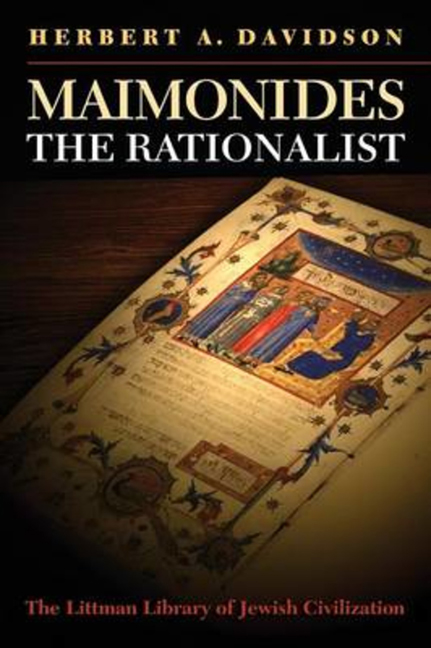Book contents
- Frontmatter
- Dedication
- Preface and Acknowledgements
- Contents
- Publisher's Note on Transliteration
- Abbreviations and Note on Sources
- 1 The Study of Philosophy as a Religious Obligation
- 2 The First Two Positive Divine Commandments
- 3 Maimonides' Knowledge of the Philosophical Literature in his Rabbinic Period
- 4 Maimonides' Shemonah perakim and Alfarabi's Fuṣūl Muntaza'a
- 5 Maimonides' Knowledge of the Philosophical Literature in his Later Period
- 6 Maimonides on Metaphysical Knowledge
- 7 A Problematic Sentence in Moreh nevukhim, ii. 24
- 8 Maimonides' Ethical Systems
- 9 Maimonides the Rationalist
- Works Cited
- Index
4 - Maimonides' Shemonah perakim and Alfarabi's Fuṣūl Muntaza'a
- Frontmatter
- Dedication
- Preface and Acknowledgements
- Contents
- Publisher's Note on Transliteration
- Abbreviations and Note on Sources
- 1 The Study of Philosophy as a Religious Obligation
- 2 The First Two Positive Divine Commandments
- 3 Maimonides' Knowledge of the Philosophical Literature in his Rabbinic Period
- 4 Maimonides' Shemonah perakim and Alfarabi's Fuṣūl Muntaza'a
- 5 Maimonides' Knowledge of the Philosophical Literature in his Later Period
- 6 Maimonides on Metaphysical Knowledge
- 7 A Problematic Sentence in Moreh nevukhim, ii. 24
- 8 Maimonides' Ethical Systems
- 9 Maimonides the Rationalist
- Works Cited
- Index
Summary
Listen to the truth from whoever speaks it.
MAIMONIDES Shemonah perakim, introductionTHE MOST EXTENSIVE QUOTATIONS from a philosophical text in Maimonides’ Commentary on the Mishnah occur when he arrives at tractate Avot. As an introduction to his commentary on Avot, Maimonides furnishes the background in psychology, ethical theory, and related matters that he thinks readers will need in order to understand the mishnaic tractate and his comments on it. As noted earlier, his introduction is divided into eight chapters and accordingly is known by the unimaginative title Shemonah perakim (Eight Chapters).
In his introduction to Shemonah perakim—in other words, his introduction to the introduction—Maimonides writes: the chapters (Fuṣūl) that follow are fashioned from ‘statements [kalâm] of the rabbis … as well as from statements [kalâm] of the ancient [qudum] and recent philosophers and from many [other] compositions…. Listen to the truth from whoever speaks it.’ He continues: ‘Sometimes, moreover, I copy an entire quotation verbatim from a well known book.’ He gives two reasons for not naming the source or sources of his extensive quotations. The first is trivial: if he named the person whom he quotes every time he offered a quotation, he would add unnecessarily to the length of the introduction. The second sounds like the real reason: the name of ‘that person’ could lead a narrow-minded reader to assume that the statement quoted is ‘corrupt’ and contains something ‘evil’. Readers may not listen to the truth if they know who it is that speaks it.
Although Maimonides refers to ancient and recent philosophers and to ‘many’ other compositions, all the identifiable quotations in Shemonah perakim can be traced to a single source, the well-known book that he mentions. The book is not Aristotle's Nicomachean Ethics, as some have supposed, but a more straightforward and accessible work by Alfarabi that has been published under two titles: Fuṣūl al-madanî and Fuṣūl muntaza'a, that is to say, Fuṣūl for the Statesman and Excerpted Fuṣūl.
Alfarabi's book comprises about 100 fuṣûl—the manuscripts differ slightly in their contents and in the way they divide the fuṣûl—which range in length from a sentence or two to a couple of pages but usually consist of a single paragraph.
- Type
- Chapter
- Information
- Maimonides the Rationalist , pp. 85 - 98Publisher: Liverpool University PressPrint publication year: 2011



